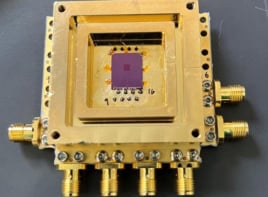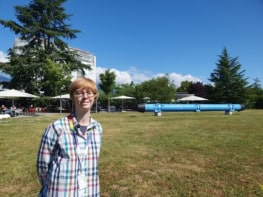
The US Department of Justice has announced it will not prosecute Xiaoxing Xi – a former chair of Temple University’s physics department – for sharing information on sensitive technology with Chinese colleagues. The decision comes after prosecutors realized that the blueprints they had used as evidence did not describe the technology at issue.
Xi is a naturalized American citizen of Chinese ancestry, who specializes in thin-film materials and had been accused of sharing information about a commercial product called a “pocket heater”. The device is made by US-based Superconductor Technologies Inc. (STI), and can be used to manufacture magnesium-diboride superconducting thin films. Xi had previously signed an agreement with STI to keep the design of the device secret.
E-mail exchanges
Xi was arrested and handcuffed at his home by armed FBI agents in May 2015, on the basis of evidence that included four e-mail exchanges during 2010 with “an associate in China”. According to prosecutors, the exchange discussed means to “advance the field of superconductivy in China” and included drawings of the pocket heater. Responding to the arrest, Temple University relieved Xi of his physics chairmanship, although he was able to remain in the physics department.
I am relieved that the justice system has done its work and the threat of criminal prosecution has been lifted
Xiaoxing Xi, Temple University
The case fell apart, however, when leading authorities in thin-film materials, including a co-inventor of the pocket heater, Ward Ruby, convinced prosecutors that the drawings did not describe the pocket heater. “It is an extremely technical area. That’s the problem,” says Xi’s lawyer Peter Zeidenberg. “I think what happened is that certain assumptions were made that were incorrect.” The e-mail messages, Zeidenberg continued, “represented the kind of international academic collaboration that governments and universities encourage”. In a statement, Xi says that he is “relieved that the justice system has done its work and the threat of criminal prosecution has been lifted”.
Similar cases
The collapse of Xi’s prosecution comes six months after government lawyers dropped criminal charges against another naturalized American of Chinese ancestry. They charged National Weather Service hydrologist Sherry Chen, a specialist in modelling water flows in rivers, with unlawfully downloading information on US waterways for a Chinese official. The information turned out to be publicly available.
Another naturalized Chinese scientist to have come under suspicion was Wen Ho Lee – a physicist at the Los Alamos National Laboratory – who in 1999 was charged with spying for China and spent nine months in solitary confinement before the case was dropped. “We now have another example of apparent discriminatory arrest and discriminatory charging by federal officials,” California Democratic Congressman Ted Lieu commented in response to Xi’s case.
‘Ridiculous charges’
Xi is now free to resume his research and teaching at Temple University. “As far as we’re concerned, nothing has changed,” Jim Napolitano, who replaced Xi as physics department head, told Physics World. “We set things up so that he could devote all of his energies to fight these ridiculous charges.” Napolitano emphasizes that the physics department and the entire Temple University community have supported Xi since his arrest. Xi has not yet returned to the physics department, but Napolitano expects him to do so soon. “He has a very strong group of graduate students who have kept things going,” he says. “They are getting ready to receive their PhDs in December.”
Xi describes his research in the video above, which was released earlier this year.



